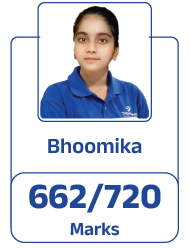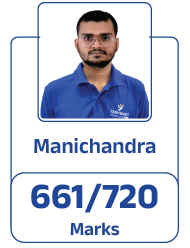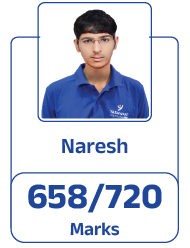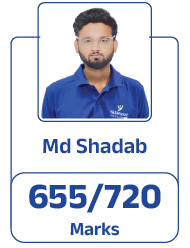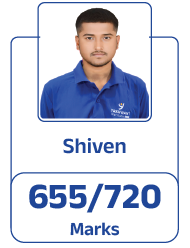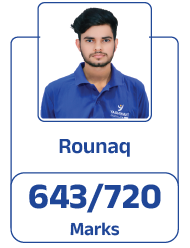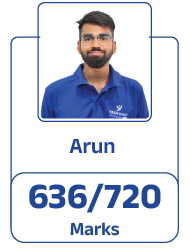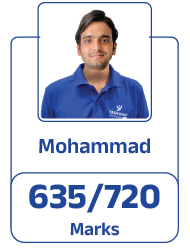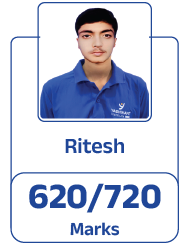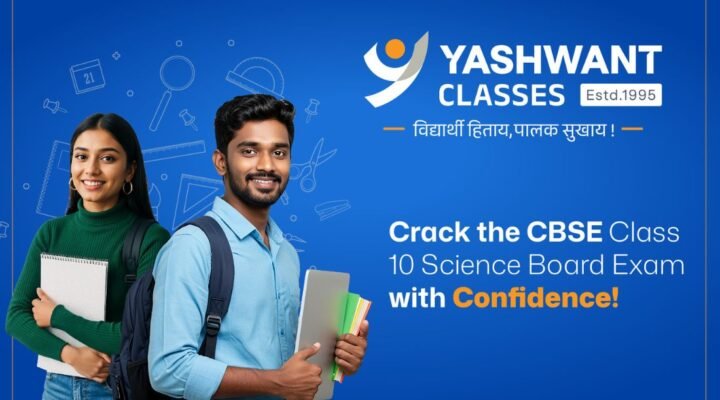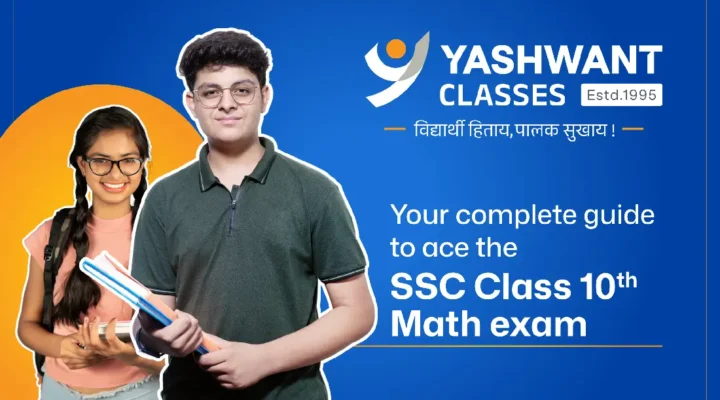
Courses
NEET 2026
YOUR PATH TO BECOMING A DOCTOR

- MEET OUR ACADEMIC HEAD
Jay Shankar Jha
A BTech graduate, Jay Shankar Jha is a passionate mathematics educator with 14+ years of experience. Having mentored over 15,000 JEE and NEET aspirants, he is a role model for students, known for his expertise and dedication. As the JEE department head at Yashwant Classes, he continues to inspire and shape future engineers and doctors with his strategic teaching approach.
NEET (National Eligibility cum Entrance Test) is India’s most important entrance exam for students aspiring to become doctors. Every year, lakhs of students appear for NEET to secure admission in prestigious medical colleges like AIIMS, JIPMER, AFMC, and top government and private medical institutes across the country. Without proper planning and guidance, NEET can feel overwhelming.
At Yashwant Classes, we support our students step by step through building strong basics, teaching proven strategies, and instilling the confidence to succeed. One of the Best NEET Classes in Balaji Nagar, Pune, we focus on providing personalised guidance to help every student excel. Our mission is clear: to make preparation stress-free, concepts crystal clear, and every student confident on exam day. In Pune, we are recognised for our top-tier NEET coaching and student success.
NEET 2026 SYLLABUS
The NEET 2026 syllabus includes Physics, Chemistry, and Biology from both Class 11 and 12. While it follows NCERT closely, students must move beyond memorising to applying concepts effectively. Biology forms the largest weightage, but Physics and Chemistry require consistent practice. At Yashwant Classes, our structured study plans and regular revisions make covering the entire syllabus easier and ensure students are ready for any level of difficulty.
| BIOLOGY | Physics | Chemistry |
|---|---|---|
| Diversity in living world | Physics and Measurement | Basic Concept in Chemistry |
| Structural organization in animals and plants | Kinematics | Atomic structure |
| Cell structure and function | Laws of Motion | Chemical Bonding & Molecular Structure |
| Plant Physiology | Work, Energy & Power | Chemical Thermodynamics |
| Human Physiology | Rotational Motion | Solutions |
| Reproduction | Gravitation | Equilibrium |
| Genetics and Evolution | Properties of Solids & Liquids | Redox Reactions & Electochemistry |
| Biology and Human Welfare | Thermodynamics | Chemical Kinetics |
| Biotechnology and its applications | Kinetic Theory of Gases | Classification & Elements & Periodicity in Properties |
| Ecology and Environment | Oscillation & Waves | P-block Elements |
| - | Electrostatics | D-& F-block Elements |
| - | Current Electricity | Coordination Compounds |
| - | Magnetic Effect of Current & Magnetism | Purification & Characterization of Organic Compounds |
| - | Electromagnetic Induction & Alternating Current | Some Basic Principles of Organic Chemistry |
| - | Electromagnetic Waves | Hydrocarbons |
| - | Optics | Organic Compounds Containing Halogen |
| - | Dual Nature of Matter & Radiation | Organic Compounds Containing Oxygen |
| - | Atoms & Nuclei | Organic Compounds Containing Nitrigen |
| - | Electronic Devices | Biomolecules |
| - | Experiment Skills | Principles Related to Practical Chemistry |
Diversity in living world
Structural organization in animals and plants
Cell structure and function
Plant Physiology
Human Physiology
Reproduction
Genetics and Evolution
Biology and Human Welfare
Biotechnology and its applications
Ecology and Environment
Physics and measurement
Kinematics
Laws of Motion
Work, Energy and Power
Rotational Motion
Gravitation
Properties of Solids and Liquids
Thermodynamics
Kinetic Theory of Gases
Oscillation and Waves
Electrostatics
Current Electricity
Magnetic Effect of Current and Magnetism
Electromagnetic Induction and Alternating Current
Electromagnetic Waves
Optics
Dual Nature of Matter and Radiation
Atoms and Nuclei
Electronic Devices
Experimental Skills
Basic Concepts in Chemistry
Atomic Structure
Chemical Bonding and Molecular Structure
Chemical Thermodynamics
Solutions
Equilibrium
Redox Reactions and Electrochemistry
Chemical Kinetics
Classification of Elements and Periodicity in Properties
P-block elements
D- and F-block elements
Coordination Compounds
Purification and Characterization of Organic Compounds
Some Basic Principles of Organic Chemistry
Hydrocarbons
Organic Compounds containing Halogen
Organic Compounds containing Oxygen
Organic compounds containing Nitrogen
Biomolecules
Principles related to practical Chemistry
NEET 2026 EXAM PATTERN
The NEET 2026 exam is an offline, pen-and-paper test with multiple-choice questions. It consists of:
- Physics: 45 questions (180 marks)
- Chemistry: 45 questions (180 marks)
- Biology (Botany + Zoology): 90 questions (360 marks)
A total of 180 questions is provided, all of which are compulsory. With +4 marks for correct answers and -1 for wrong answers, accuracy is just as important as speed. Knowing the exam pattern in detail helps students manage time, attempt smartly, and maximise scores.
Neet 2026 Paper Pattern and Markings
| Section A (All Questions are Compulsory) | Section B (All Questions are Compulsory) | ||
|---|---|---|---|
| Types of Question | MCQ | MCQ | |
| Physics | 35Q × 4 Marks: 140 Marks | 10Q × 4 Marks: 40 Marks | Total: 180 Marks |
| Chemistry | 35Q × 4 Marks: 140 Marks | 10Q × 4 Marks: 40 Marks | Total: 180 Marks |
| Botany | 35Q × 4 Marks: 140 Marks | 10Q × 4 Marks: 40 Marks | Total: 180 Marks |
| Zoology | 35Q × 4 Marks: 140 Marks | 10Q × 4 Marks: 40 Marks | Total: 180 Marks |
| Marking Scheme | +4 for correct answer −1 for incorrect answer 0 for unanswered | +4 for correct answer −1 for incorrect answer 0 for unanswered | Total: 720 Marks |
| Time / Q | 1 minute | 1 minute |
NEET 2026 ELIGIBILITY CRITERIA
To be eligible for NEET-UG 2026, you must be at least 17 years old by December 31, 2026, and there’s no upper age limit as per current guidelines. You should have passed (or be appearing in) your 10+2 (or equivalent) exams with core subjects including Physics, Chemistry, Biology/Biotechnology, and English. You must meet the minimum qualifying marks, 50% overall for the General category, 40% for OBC/SC/ST candidates, and 45% for PwD applicants. There is no restriction on the number of attempts, anyone meeting these requirements can take NEET as many times as needed.
NEET 2026 EXAM DATES
The National Testing Agency (NTA) is expected to conduct the NEET 2026 exam on May 3, 2026, which falls on the first Sunday of May. This date is tentative, and the official confirmation will be provided in the Information Bulletin on the NTA website. Along with the exam date, the NTA will also release the complete NEET 2026 schedule, including registration, admit card availability, and result timelines. Candidates should regularly check updates on the official website to plan their revision effectively and ensure they do not miss any important deadlines.
Top MBBS College in India
| India's Top Medical Colleges | Location |
|---|---|
| All India Institute of Medical Science | Delhi |
| Christian Medical College | Vellore |
| Armed Forces Medical College | Pune |
| Maulana Azad Medical College | Delhi |
| JIPMER | Pondicherry |
| King Jorge Medical University | Lucknow |
| Institute of Medical Science | Banaras |
| Lady Hardinge Medical College | New Delhi |
| Vardhman Mahveer Medical College | Delhi |
| King Edward Memorable Medical College | Mumbai |
Top MBBS College in Maharashtra
| Maharashtra's Top Medical Colleges | Location |
|---|---|
| Armed Forces Medical College | Pune |
| King Edward Memorable Medical College | Parel |
| Grant Medical College (JJ) | Mazgaon, Mumbai |
| Nair Medical college | Mumbai |
| Lokmanya Tilak Medical College | Sion, Mumbai |
| Indira Gandhi Govt. Medical College | Nagpur |
| Govt. Medical College | Aurangabad |
| Govt. Medical College and Hospital | Nagpur |
| Dr. Shankarrao Chavan Medical College | Nanded |
Frequently Asked questions for NEET
NEET 2026 registration is expected to start in the first quarter of 2026 through the NTA official website.
The NEET 2026 admit card will be released about 7–10 days before the exam date on the official NTA portal.
Currently, there is no attempt limit for NEET, but students must meet age and qualification requirements.
Students need to secure at least the 50th percentile (40th for reserved categories) to qualify. However, top colleges require much higher scores.
The exam duration is 3 hours and 20 minutes (200 minutes). Proper practice is essential for time management.
No. NEET scores are used for MBBS, BDS, BAMS, BHMS, BSMS, BUMS, Veterinary Sciences, and other medical and allied courses.
Why choose Yashwant Classes?
Learn from IITians, NITians, and experienced mentors with one-on-one doubt-solving.
Our IIT & NIT alumni interact with students to inspire, guide, and share their success strategies.
Small, well-structured batches ensure personalized attention and better understanding.
Comprehensive, exam-oriented material with a special focus on NEET preparation.
Regular in-depth analysis of tests and doubt clearance sessions to strengthen concepts.
Subject-specific faculty and targeted teaching approaches for NEET aspirants.
Save time with structured coaching schedules integrated with 11th & 12th college admissions.
Expert counseling to help students choose the right college based on NEET ranks.
At Yashwant Classes, we don’t just prepare students for NEET; we shape future engineers!
Hey, Join us!
** We respect your privacy and do not tolerate spam and will never sell, rent, lease or give away your information to any third party.
NEET Achievers 2025
